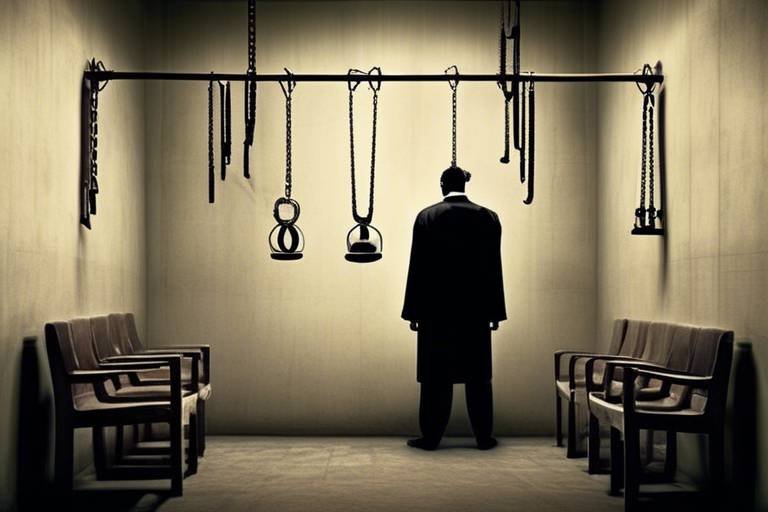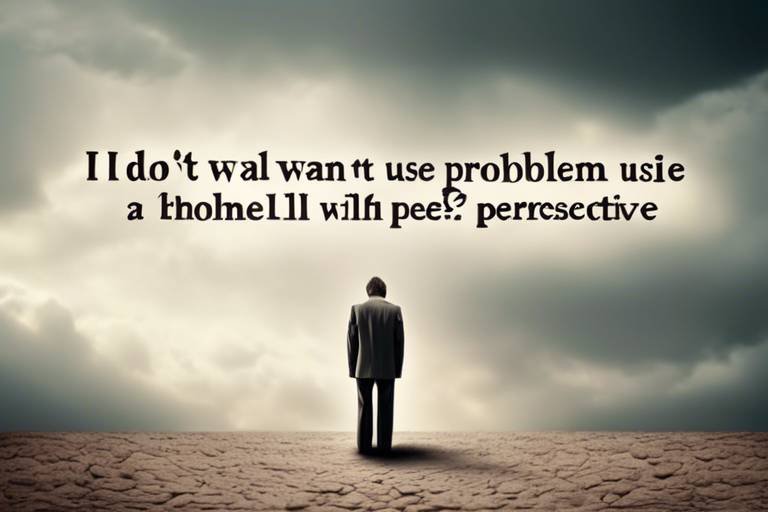The Ethical Boundaries of Freedom of Speech
Freedom of speech is often heralded as one of the cornerstones of a democratic society. It’s that exhilarating rush of being able to express your thoughts without fear of retribution. However, the reality is that this freedom comes with a complex web of ethical considerations that can often feel like walking a tightrope. Imagine standing at the edge of a cliff, with the vast ocean of ideas below you. On one side, the waves represent the freedom to express oneself; on the other, the rocky shore symbolizes the potential harm that can arise from unbridled speech. This article dives deep into the intricate interplay between freedom of speech and ethical boundaries, exploring how our societal values shape our understanding of what can be said and the implications of crossing those boundaries.
At its core, freedom of speech is a fundamental right that empowers individuals to voice their opinions without fear of censorship or punishment. Historically, this right has been fiercely protected in democratic societies, often viewed as a vital component of personal liberty and societal progress. Think about the brave souls who fought for this right throughout history; their struggles paved the way for the freedoms we enjoy today. But what does it really mean to have the freedom to speak? Is it merely the absence of restrictions, or does it also entail a responsibility to use that freedom wisely? This section delves into the historical context and significance of freedom of speech, examining how it has evolved and the role it plays in shaping our democratic ideals.
While freedom of speech is a cherished right, ethics play a crucial role in determining its limits. Ethics, in essence, are the moral principles that govern our behavior and decision-making. They help us navigate the murky waters of acceptable discourse, guiding us on what is considered appropriate to say and what crosses the line into harmful territory. For instance, when does a provocative opinion become an act of aggression? This section discusses how our moral compass influences our perceptions of free speech and highlights the responsibilities that come with this freedom. After all, with great power comes great responsibility—an adage that rings particularly true in the realm of speech.
The distinction between hate speech and free speech is often contentious, sparking heated debates across various platforms. Hate speech can be defined as any form of communication that vilifies or discriminates against individuals based on attributes such as race, religion, or sexual orientation. On the other hand, free speech encompasses a broad range of expressions, including those that may be unpopular or controversial. So, where do we draw the line? Here, we explore the definitions, implications, and legal perspectives surrounding hate speech, alongside its ethical considerations. It’s a complex issue that requires careful examination of both the rights of the speaker and the potential harm to the targeted individuals.
Different countries have varying legal frameworks regarding hate speech, reflecting their unique societal values and historical contexts. For example, in the United States, the First Amendment offers robust protections for free speech, including hate speech, unless it incites violence. Conversely, many European nations have stricter laws that criminalize hate speech to protect citizens from discrimination and harm. This subsection examines how these laws not only reflect societal values but also present ethical dilemmas. Are laws that limit speech a necessary safeguard, or do they infringe on individual liberties? The answers are far from straightforward.
The social consequences of hate speech can be profound and far-reaching. Hate speech doesn’t just harm individuals; it can also erode community cohesion and perpetuate cycles of violence and discrimination. The ethical responsibilities of individuals and platforms in curbing hate speech are paramount. Should social media companies act as gatekeepers of what can be said? This subsection highlights the potential harm caused by hate speech and the moral obligation of society to address it. It raises the question: how do we balance the right to express oneself with the need to protect vulnerable communities?
The rise of digital platforms has transformed the landscape of free speech, creating both opportunities and challenges. Social media has become a powerful tool for self-expression, allowing voices that were once marginalized to be heard. However, this democratization of speech also comes with ethical challenges. Misinformation, cyberbullying, and the spread of hate speech can proliferate in these online spaces, leading to real-world consequences. This section analyzes how these platforms impact our understanding of free speech and the ethical dilemmas that arise in this digital age.
Striking a balance between the right to free speech and the responsibility to prevent harm is essential in any society. This balance is often guided by ethical considerations that vary across contexts. For example, a comedian may push boundaries in a stand-up routine, while a journalist may face scrutiny for their reporting. This section discusses the ethical considerations that guide this balance, emphasizing the importance of context in determining what is acceptable speech.
Examining real-world case studies can provide valuable insights into the ethical dilemmas surrounding free speech. From controversial public figures to viral social media posts, these examples highlight the complexities involved in navigating the boundaries of free expression. Each case serves as a reminder that the implications of our words can ripple through society in unexpected ways.
As society evolves, so do the discussions around free speech. The rapid advancement of technology and shifting cultural norms will undoubtedly bring new ethical challenges to the forefront. This subsection speculates on future trends and the ethical dilemmas that may arise, prompting us to consider how we can adapt our understanding of free speech to meet the demands of a changing world.
- What is the difference between free speech and hate speech? Free speech refers to the right to express any opinion, while hate speech specifically targets individuals or groups based on attributes like race or religion.
- Are there limits to freedom of speech? Yes, while freedom of speech is a fundamental right, there are legal and ethical limits, especially when it comes to speech that incites violence or discrimination.
- How does social media impact free speech? Social media amplifies voices but also poses challenges like misinformation and hate speech, complicating the landscape of free expression.

Understanding Freedom of Speech
Freedom of speech is often hailed as a cornerstone of democracy, empowering individuals to voice their thoughts, opinions, and beliefs without fear of repression. But what does this really mean? To grasp the full essence of freedom of speech, we must dive into its historical context and significance in democratic societies. It’s not just about saying whatever pops into your head; it’s about fostering an environment where diverse ideas can flourish. Imagine a garden where every flower represents a different thought or opinion. Just as a garden thrives on variety, a society flourishes when it embraces a wide array of viewpoints.
Historically, the concept of free speech has evolved dramatically. In ancient times, many societies restricted speech to maintain control and suppress dissent. Fast forward to the Enlightenment, where thinkers like John Locke and Voltaire championed the idea that individuals should be free to express their thoughts. This shift laid the groundwork for modern democratic principles, leading to the inclusion of free speech in foundational documents such as the First Amendment of the United States Constitution. Here, it’s not just a right; it’s a fundamental pillar that supports the very structure of democracy.
However, freedom of speech is not an absolute right. It comes with a set of responsibilities and ethical considerations. For instance, while you might have the freedom to express your opinions, should you use that freedom to spread misinformation or hate? This is where the ethical boundaries of free speech come into play. Just like a double-edged sword, free speech can be both a tool for progress and a weapon for harm. It’s essential to navigate this landscape carefully, weighing the benefits of open dialogue against the potential risks of harmful speech.
Furthermore, the implications of free speech extend beyond individual expression. They shape societal norms and values, influencing everything from political discourse to cultural movements. In many ways, the way we regulate and understand free speech reflects our collective conscience. For instance, consider how social movements have used the power of speech to challenge injustices. The civil rights movement, for example, relied heavily on the ability to speak out against oppression, highlighting how essential free speech is in the fight for equality.
In summary, understanding freedom of speech involves recognizing its historical significance, its role in democracy, and the ethical responsibilities that accompany it. As we continue to navigate this complex terrain, it’s crucial to remember that while we are free to speak, we must also be mindful of the impact our words can have on others. After all, in the grand tapestry of society, every thread—every voice—matters.

The Role of Ethics in Speech
Ethics play a pivotal role in shaping our understanding of free speech. While the right to express oneself is enshrined in various legal frameworks, the ethical considerations surrounding that speech can often complicate matters. Think of it like a double-edged sword; on one side, you have the power to voice your thoughts freely, but on the other, you carry the responsibility of considering the impact of those words on others. It’s a balancing act that requires a deep understanding of moral principles and societal values.
At its core, ethics in speech revolves around the principles of respect, integrity, and responsibility. When we speak, we not only express our opinions but also influence the perceptions and feelings of those who hear us. This influence can be profound, leading to either constructive dialogue or destructive conflict. For instance, consider a simple conversation among friends: if one person shares a controversial opinion without considering the feelings of others, it can lead to tension and hurt feelings. This scenario highlights the importance of being aware of the ethical implications of our words.
Moreover, the context in which speech occurs is crucial. What might be acceptable in a private setting could be deemed inappropriate in a public forum. This is where ethical considerations become even more complex. For instance, in professional environments, the expectation of maintaining a level of decorum and respect often supersedes the desire for unfiltered expression. Here, ethics act as a guiding principle, encouraging individuals to think critically about the potential consequences of their speech.
In today’s interconnected world, the reach of our words has expanded exponentially. Social media platforms have become the modern town squares where ideas are exchanged at lightning speed. However, this rapid dissemination of information often comes with ethical dilemmas. For example, the ease of sharing opinions can lead to the spread of misinformation or hate speech, which can have real-world consequences. The ethical responsibility lies not just with the speaker but also with the platforms that host these conversations.
To better understand the role of ethics in speech, consider the following key points:
- Respect for Others: Every individual has the right to be heard, but this should not come at the expense of another's dignity.
- Integrity: Upholding honesty in what we say fosters trust and credibility.
- Responsibility: Understanding that our words can have consequences encourages thoughtful communication.
Ultimately, the role of ethics in speech is about finding a harmonious balance between expressing oneself and being mindful of the impact those expressions have on others. It’s a dance of sorts, where each step must be taken with care and consideration. As we navigate this complex landscape, it’s essential to remember that our voices carry weight, and with that weight comes the responsibility to use them wisely.
Q1: Why are ethics important in speech?
A1: Ethics are crucial because they guide individuals in expressing their thoughts while considering the impact of their words on others. They help maintain respect and integrity in conversations.
Q2: How can I ensure my speech is ethical?
A2: To ensure your speech is ethical, always consider the feelings of your audience, avoid spreading misinformation, and strive for honesty in your expressions.
Q3: What are the consequences of unethical speech?
A3: Unethical speech can lead to misunderstandings, conflict, and harm to individuals or communities. It can also damage relationships and reputations.

Hate Speech vs. Free Speech
The debate surrounding hate speech and free speech is a complex and often heated topic. At its core, it raises fundamental questions about the limits of expression and the ethical responsibilities that come with it. While freedom of speech is celebrated as a cornerstone of democratic societies, the emergence of hate speech challenges this ideal. So, what exactly defines hate speech, and how does it differ from the broader concept of free speech?
Hate speech is generally understood to be any form of communication that belittles or discriminates against individuals or groups based on attributes such as race, religion, ethnicity, sexual orientation, or gender. It is speech that incites violence or prejudicial action against these groups and is often seen as a direct attack on their dignity. On the other hand, free speech encompasses a wider array of expressions, including opinions, beliefs, and ideas that may not necessarily be popular or agreeable. The crux of the issue lies in determining where the line is drawn between these two forms of expression.
To illustrate this distinction, consider the following:
| Aspect | Hate Speech | Free Speech |
|---|---|---|
| Definition | Speech that attacks or discriminates against a group | Expression of opinions, ideas, or beliefs |
| Intent | To harm or incite violence | To inform, persuade, or entertain |
| Legal Status | Often restricted or regulated | Generally protected under law |
When we look at the legal perspectives, different countries have different approaches to these issues. In the United States, for instance, the First Amendment provides robust protections for free speech, even when that speech is offensive or hateful. However, in many European countries, hate speech laws are much stricter, reflecting a societal consensus that the harm caused by such speech outweighs the benefits of unrestricted expression.
This leads us to an important question: should the right to free speech be absolute? Many argue that allowing hate speech to flourish leads to a culture of intolerance and violence. Others contend that restricting speech, even hate speech, sets a dangerous precedent that could erode the very freedoms we cherish. The ethical implications are profound, as they force us to consider not just the rights of the speaker, but also the rights and safety of those who may be affected by such speech.
In conclusion, the tension between hate speech and free speech is a reflection of deeper societal values and ethical considerations. As we navigate this complex landscape, it's crucial to engage in open dialogue, recognize the nuances, and strive for a balance that respects both the freedom to express oneself and the responsibility to protect the dignity of all individuals.

Legal Frameworks
When it comes to the governing free speech, the landscape is anything but uniform. Different countries have established their own laws that reflect their unique cultural, historical, and ethical contexts. For instance, in the United States, the First Amendment guarantees a robust protection of free speech, allowing individuals to express themselves with minimal government interference. However, this freedom is not absolute; there are well-defined exceptions, such as obscenity, defamation, and incitement to violence.
In contrast, many European countries adopt a more restrictive approach. Countries like Germany and France have enacted laws that specifically prohibit hate speech and any form of expression that could incite racial or religious hatred. This legal stance is rooted in their historical experiences with totalitarian regimes and the devastating consequences of unchecked speech. To illustrate the differences, consider the following table:
| Country | Free Speech Protection | Restrictions |
|---|---|---|
| United States | Strong | Obscenity, Defamation, Incitement |
| Germany | Moderate | Hate Speech, Nazi Propaganda |
| France | Moderate | Hate Speech, Holocaust Denial |
| United Kingdom | Moderate | Hate Speech, Defamation |
This divergence in legal frameworks raises important ethical questions. For example, should free speech be prioritized above all else, or should it be tempered by the need to protect vulnerable groups from harm? The challenge lies in finding a balance that respects individual rights while also acknowledging the potential consequences of certain types of speech.
Moreover, the legal definitions and interpretations of hate speech can vary significantly from one jurisdiction to another. In the U.S., the Supreme Court has been reluctant to impose strict regulations on speech, often siding with the notion that more speech, even if offensive, is preferable to censorship. On the other hand, European courts have been more willing to uphold laws that restrict hate speech in the name of public order and social harmony.
As we navigate these complex legal waters, it’s crucial to consider the implications of these laws on our everyday lives. How do they shape public discourse? What responsibilities do individuals and platforms have in adhering to these laws while still promoting a culture of open dialogue? These are questions that we must continually grapple with as society evolves.
In conclusion, the legal frameworks surrounding freedom of speech are deeply intertwined with ethical considerations. As we look to the future, it is essential to remain vigilant in examining how these laws adapt to changing societal norms and technological advancements, ensuring that they reflect our collective values while protecting the rights of all individuals.
- What is the difference between free speech and hate speech? Free speech refers to the right to express any opinion without censorship, while hate speech specifically targets individuals or groups based on attributes such as race, religion, or sexual orientation and is often restricted by law.
- Are there any universal laws governing free speech? No, free speech laws vary significantly from country to country, influenced by cultural and historical contexts.
- Can social media platforms censor free speech? Yes, social media platforms often have their own policies that go beyond legal requirements, allowing them to regulate content that violates their community standards.

Social Consequences
The ripple effects of hate speech extend far beyond the immediate moment of its utterance. It's like tossing a stone into a calm pond; the waves it creates can disturb the entire surface, affecting not just the area where the stone landed, but also reaching the farthest edges of the water. Hate speech can lead to a myriad of social consequences that can alter the fabric of communities and societies at large.
One of the most profound consequences is the division it fosters within communities. When individuals or groups are targeted through derogatory or inflammatory language, it can create an atmosphere of distrust and animosity. This division can escalate into larger conflicts, where entire communities may find themselves at odds. For instance, the rise of hate speech online has been linked to increased polarization in political and social discussions, causing people to retreat into echo chambers where their views are constantly reinforced, rather than challenged.
Moreover, the impact of hate speech often manifests in psychological harm to individuals who are targeted. Victims may experience a range of negative emotions, including fear, anxiety, and depression. This can lead to a sense of isolation, as individuals may feel unsafe in their own communities or online spaces. The long-term psychological effects can be debilitating, affecting not only the victims but also their families and friends. It's crucial to recognize that the words we choose to use carry weight, and their consequences can linger long after the words have been spoken.
Additionally, hate speech can contribute to a culture of impunity, where individuals feel emboldened to express harmful opinions without fear of repercussions. This normalization of hate can create a toxic environment where discrimination and violence become more acceptable. For example, studies have shown that increased hate speech correlates with a rise in hate crimes, as the rhetoric can incite individuals to act on their prejudices. In this sense, the ethical responsibility of individuals and platforms becomes even more pronounced, as they must navigate the fine line between protecting free speech and preventing harm.
To illustrate the social consequences of hate speech, consider the following table summarizing the potential impacts:
| Social Consequence | Description |
|---|---|
| Community Division | Fosters distrust and animosity between different groups. |
| Psychological Harm | Causes fear, anxiety, and depression among targeted individuals. |
| Culture of Impunity | Encourages harmful behavior and normalizes discrimination. |
| Increased Violence | Links hate speech to a rise in hate crimes and violent acts. |
In conclusion, the social consequences of hate speech are far-reaching and complex. As we navigate this challenging landscape, it's essential to foster a culture of respect and understanding. By recognizing the power of our words and the potential harm they can cause, we can work towards creating a more inclusive and compassionate society.
- What is hate speech? Hate speech refers to any communication that belittles or discriminates against individuals or groups based on attributes such as race, religion, gender, or sexual orientation.
- How does hate speech affect society? Hate speech can lead to division, psychological harm to individuals, and an increase in violence and discrimination within communities.
- What can be done to combat hate speech? Education, open dialogue, and responsible use of social media platforms can help mitigate the impact of hate speech.
- Is hate speech protected under free speech laws? This varies by country; some nations have strict laws against hate speech, while others prioritize free speech even when it includes hateful content.

Free Speech in the Digital Age
In today’s hyper-connected world, the digital age has redefined the landscape of free speech in ways we never imagined. Social media platforms, blogs, and forums have become the new town squares, where opinions can be shared at the speed of light. But with this freedom comes a myriad of challenges and ethical dilemmas that are as complex as they are important. Have you ever wondered how a tweet can spark a global movement or how a single post can lead to widespread outrage? This is the power of digital speech, but with great power comes great responsibility.
One of the most striking aspects of free speech in the digital realm is the sheer volume of voices that can be heard. Unlike traditional media, where a select few control the narrative, anyone with internet access can express their thoughts. This democratization of speech is a double-edged sword. On one hand, it empowers marginalized voices and fosters diversity of thought; on the other hand, it can also lead to the spread of misinformation and hate speech. In fact, studies have shown that misinformation travels faster online than the truth. This raises the question: how do we navigate this chaotic sea of information while upholding the principles of free speech?
Moreover, the algorithms that govern social media platforms play a significant role in shaping our discourse. These algorithms are designed to maximize engagement, often promoting sensational or polarizing content. As a result, users may find themselves in echo chambers, where their views are constantly reinforced, rather than challenged. This phenomenon can distort our understanding of free speech, leading to a skewed perception of what is acceptable to say. Are we truly free to express ourselves, or are we merely echoing the sentiments that algorithms deem worthy of amplification?
Another critical aspect of free speech in the digital age is the role of platforms themselves. Companies like Facebook, Twitter, and YouTube have developed their own content moderation policies, which can sometimes feel arbitrary. Users often find themselves at the mercy of these policies, leading to censorship concerns. For instance, a post that one person sees as a legitimate critique may be flagged as hate speech by the platform, resulting in its removal. This raises a fundamental question: who gets to decide what is acceptable speech, and what are the ethical implications of their decisions?
To navigate the complexities of free speech in the digital age, it is essential for individuals, platforms, and lawmakers to engage in ongoing dialogue. We must consider the following key points:
- Transparency: Platforms should provide clear guidelines on what constitutes acceptable speech and how moderation decisions are made.
- Accountability: Users should hold platforms accountable for their moderation practices, advocating for fairness and consistency.
- Education: Promoting digital literacy can empower users to critically evaluate the content they encounter online.
In conclusion, free speech in the digital age is a complex and evolving issue that requires careful consideration of ethical implications. As we continue to explore this landscape, we must strive to balance the right to express ourselves with the responsibility to foster a safe and respectful online environment. The future of free speech is in our hands, and it is crucial that we approach it with thoughtfulness and integrity.
- What is the definition of free speech in the digital age? Free speech in the digital age refers to the ability to express opinions and ideas freely through digital platforms without censorship or restraint, while also considering the ethical responsibilities that come with it.
- How do social media platforms influence free speech? Social media platforms influence free speech by controlling the algorithms that determine what content is shown to users, which can create echo chambers and impact public discourse.
- What are the ethical challenges of moderating online speech? Ethical challenges include determining what constitutes hate speech versus free speech, ensuring transparency in moderation practices, and balancing the need for safety with the right to express diverse opinions.

Balancing Rights and Responsibilities
In a world where the right to free speech is celebrated as a cornerstone of democracy, the challenge lies in balancing this freedom with the responsibility to prevent harm. It’s like walking a tightrope; on one side, we have the vibrant expression of ideas, opinions, and beliefs, while on the other side lurks the potential for misinformation, hate speech, and the incitement of violence. So, how do we navigate this complex landscape? The answer isn't straightforward, but it involves a careful consideration of ethical principles and societal values.
At its core, the balancing act requires us to ask ourselves some tough questions: What are the potential consequences of our words? Are we amplifying voices that promote hatred or division? These questions are not merely rhetorical; they demand introspection and a commitment to ethical discourse. The responsibility that comes with free speech is not just about what we can say, but also about what we should say.
To illustrate this balance, consider the role of social media platforms. These digital arenas have become the modern public square, where ideas can spread like wildfire. However, with this capability comes the ethical obligation to monitor and manage the content shared. For instance, platforms like Twitter and Facebook have implemented policies to combat hate speech, misinformation, and harassment. While these measures are essential, they also raise questions about censorship and the potential stifling of legitimate discourse. Are we sacrificing the essence of free speech for the sake of safety?
Moreover, the public's response plays a crucial role in shaping this balance. When individuals and groups mobilize against harmful speech, they are exercising their own rights while holding others accountable. This dynamic interaction is vital in fostering an environment where freedom of expression does not come at the cost of societal well-being. It’s a collective effort, where each voice matters in the grand tapestry of public discourse.
In summary, achieving a balance between rights and responsibilities requires ongoing dialogue and a commitment to ethical standards. As we navigate this intricate web of free speech, we must remain vigilant in recognizing the impact of our words and the responsibilities that accompany them. After all, the true measure of freedom of speech lies not just in its exercise, but in the wisdom with which it is wielded.
- What is the importance of balancing rights and responsibilities in free speech?
Balancing rights and responsibilities ensures that freedom of expression does not infringe upon the rights of others, promoting a healthier public discourse. - How can individuals contribute to ethical speech?
Individuals can contribute by being mindful of their words, challenging harmful narratives, and promoting respectful dialogue. - What role do social media platforms play in this balance?
Social media platforms serve as both facilitators of free speech and gatekeepers against harmful content, making their role crucial in maintaining this balance.

Case Studies
When we dive into the world of freedom of speech, real-world examples often illuminate the complex ethical dilemmas that arise. One notable case is the Westboro Baptist Church protests, which have sparked intense debate over the limits of free speech. Known for their inflammatory messages, particularly at military funerals, the church argues that their protests are a form of religious expression. However, many see their actions as hate speech, raising the question: where do we draw the line between protected speech and speech that harms?
Another significant case is the Pennsylvania State University incident involving a student organization that invited a controversial speaker to campus. The uproar that followed highlighted the tension between the university's commitment to free expression and the ethical responsibility to maintain a safe environment for all students. Some argued that allowing the speaker would validate harmful ideas, while others claimed that silencing the speaker infringed on their rights. This situation exemplifies the ongoing struggle to balance rights and responsibilities in the realm of free speech.
Moreover, the Charlie Hebdo attack in France serves as a poignant reminder of the extreme consequences that can arise from the clash between free speech and ethical considerations. The satirical magazine faced backlash for its provocative cartoons depicting the Prophet Muhammad, culminating in a tragic act of violence. This incident sparked global discussions about the limits of satire and the ethical implications of offending religious sentiments. It raises a critical question: should the right to express controversial ideas outweigh the potential for harm?
To further understand these dilemmas, let’s look at a table summarizing key case studies and their implications:
| Case Study | Key Issues | Ethical Considerations |
|---|---|---|
| Westboro Baptist Church | Protests at military funerals | Hate speech vs. religious expression |
| Pennsylvania State University | Controversial speaker invitation | Campus safety vs. free expression |
| Charlie Hebdo | Satirical cartoons of Muhammad | Offense vs. freedom of the press |
These case studies illustrate the multifaceted nature of free speech and the ethical responsibilities that accompany it. As we navigate these complex waters, it’s essential to engage in open dialogue and consider the broader implications of our words and actions. After all, the ability to speak freely is a privilege that comes with the weight of responsibility. So, how do we ensure that our freedom to speak does not infringe on the rights and dignity of others? This question remains at the heart of the ongoing debate surrounding free speech.
- What is the difference between free speech and hate speech? Free speech is the right to express any opinion without censorship, while hate speech refers to speech that incites violence or prejudicial action against a particular group.
- Are there legal limits to free speech? Yes, many countries have laws that restrict hate speech, incitement to violence, and other forms of harmful speech.
- How can social media impact free speech? Social media platforms can amplify voices but also pose challenges in moderating harmful content, leading to debates over censorship and free expression.

Future Implications
The landscape of free speech is constantly evolving, especially as we navigate the complexities of our increasingly digital world. As technology advances, so do the ethical considerations surrounding the expression of ideas and opinions. One of the most pressing questions we face is: how will the rise of artificial intelligence and social media shape our understanding of free speech in the future?
Imagine a world where algorithms decide what content is appropriate to share. This scenario raises significant ethical dilemmas. On one hand, these algorithms can help filter out harmful content, but on the other, they may inadvertently suppress legitimate discourse. The balance between freedom and censorship becomes a tightrope walk, where the stakes are high. Will we allow technology to dictate our conversations, or will we find a way to maintain human oversight?
Furthermore, as cultural norms shift, so too will our definitions of acceptable speech. What was once deemed acceptable may soon become offensive as society progresses. For instance, consider the rapid changes in attitudes towards issues like gender identity and racial equality. As these conversations evolve, the potential for misunderstanding and conflict increases, challenging our ability to engage in open dialogue without crossing ethical boundaries.
In this context, we must also consider the role of education. Educating individuals about the nuances of free speech and its ethical implications can empower them to engage responsibly. Schools and universities could play a pivotal role in fostering a culture of respectful discourse, where students learn not just to express themselves but to listen and understand opposing viewpoints. This approach could mitigate some of the tensions that arise in public discussions.
Moreover, as we look to the future, we must also acknowledge the global perspective on free speech. Different cultures have varying thresholds for what constitutes acceptable speech, influenced by historical, social, and political contexts. This diversity can lead to conflicts when individuals from different backgrounds interact in digital spaces. The challenge lies in finding common ground while respecting these differences.
To summarize, the future of free speech is laden with both opportunities and challenges. As we embrace technological advancements, we must remain vigilant about the ethical implications of our choices. By fostering education, promoting understanding, and engaging in thoughtful discussions, we can navigate this complex terrain effectively. The question remains: are we prepared to tackle these challenges head-on, or will we let the winds of change sweep us away?
- What is the role of technology in shaping free speech? Technology plays a crucial role in amplifying voices but also poses challenges in regulating harmful content.
- How can education help in understanding free speech? Education can provide the tools to engage in respectful discourse and understand the ethical implications of speech.
- Are cultural differences important in discussions about free speech? Yes, cultural differences significantly influence perceptions of acceptable speech and should be respected in discussions.
- What are the ethical responsibilities of social media platforms? Social media platforms have a responsibility to balance free expression with the need to prevent harm and misinformation.
Frequently Asked Questions
- What is freedom of speech?
Freedom of speech is a fundamental right that allows individuals to express their opinions and ideas without fear of censorship or punishment. It is a cornerstone of democratic societies, enabling open discourse and the exchange of diverse viewpoints.
- How do ethics influence free speech?
Ethics play a significant role in shaping our understanding of free speech. They guide us in determining what constitutes acceptable discourse and highlight the responsibilities that come with the freedom to express oneself. This balance between rights and responsibilities is crucial in maintaining a healthy public dialogue.
- What is the difference between hate speech and free speech?
The distinction between hate speech and free speech is often debated. Hate speech refers to expressions that incite violence or discrimination against individuals or groups based on attributes like race, religion, or gender. Free speech, on the other hand, encompasses a broader range of expression, including unpopular or controversial opinions, as long as they do not promote harm.
- Are there legal frameworks for hate speech?
Yes, different countries have varying legal frameworks regarding hate speech. Some nations impose strict regulations to combat hate speech, while others prioritize free expression, allowing more room for controversial opinions. These laws reflect societal values and present ethical dilemmas regarding the balance between protecting individuals and upholding free speech.
- What are the social consequences of hate speech?
The social consequences of hate speech can be profound, leading to division, violence, and harm to targeted communities. It raises ethical responsibilities for individuals and platforms to recognize and mitigate the impact of harmful speech, fostering an environment that promotes respect and understanding.
- How has the digital age impacted free speech?
The rise of digital platforms has transformed the landscape of free speech. Social media allows for rapid dissemination of ideas, but it also brings ethical challenges, such as the spread of misinformation and hate speech. Navigating these challenges requires a careful consideration of the implications of our online expressions.
- What are some examples of ethical dilemmas in free speech?
Real-world case studies, such as controversies surrounding social media bans or protests against hate groups, illustrate the ethical dilemmas surrounding free speech. These examples reveal the complexities involved in balancing the right to express opinions with the need to prevent harm to individuals and communities.
- What are the future implications of free speech?
As society evolves, discussions around free speech will continue to grow. Future trends may include new legal challenges, shifts in societal norms, and the impact of emerging technologies. These changes will likely present ongoing ethical challenges that require thoughtful consideration and dialogue.



















